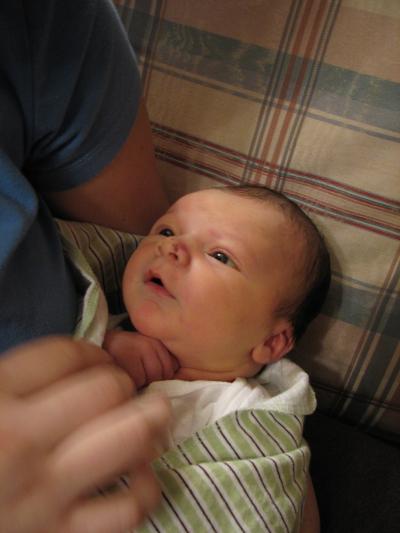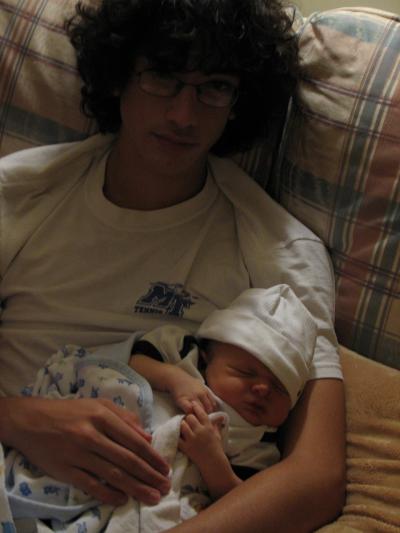God is malicious?
October 21 2006
Sovereignty
by Graham Wells (notes) 12:22am Thursday, Sep 21
I think that when it comes to God, we like to forget that sovereignty means absolute authority and control.
I think that is an uncomfortable thought. Not only does that mean that
God DOES let bad things happen (they COULDNT happen, in fact, without
His allowing them to), it really does make a lot of other issues a lot
weirder, especially the question of the doctrine of election, better
known as predestination.
In a discussion on predestination, a question occurred to me. If
election isnt true, if God doesnt already know precisely who will or
wont be saved (which, Him knowing that means that it MUST happen, which
could be seen as choosing), if that isnt in His hands, then God is NOT
all-powerful and NOT all-knowing. We know that God is both of those
things, right? I'm not saying that I'm absolutely right, but the logic
is painfully and irritatingly obvious.
So what about free will? Simple answer is that I dont know. According
to Psalms, every step of our life was written out by God before our
birth. That means He knows every sin, every joy, every mistake, every
single thing that we will do before we even think a coherent thought.
Once He knows something, that is the way it is. There are no "what if"
games with what God knows, no room for Him "knowing where each of our
choices could lead." To be all-knowing, He MUST know every answer
already. By Him knowing it, it MUST happen that way. That means that
though we have free will, we have no choice at all and we dont even
realize it.
As frustrating and ego bruising as that is, I find that I dont really
care that much. More than He cares for us, Yhwh desires His own glory.
If it is in His plan that He is glorified by my one path, then so be it.
Darned peculiar thought process. I'm reasonably certain I intended to
be in bed almost an hour ago. I dunno. I'm open to other thoughts or
people punching holes in mine. :-)
I responded with:
Karissa Krapf wrote
at 11:26pm on October 20th, 2006
The
problem is the Bible says different things about god...so no one really
knows what this supposed god is like...which is why i think hes most
likely made up...and if a god does exist we dont know shit about him-
obviously. Also, if he knows everything and is all powerful, that means
he made us sin...so he damned some of us to hell on purpose because he
put the tree there and knew what we would do if he did...messed up
stuff. but i take great comfort in knowing it probably isnt real.
Graham responded:
From:
Graham Wells
To:
Karissa Krapf
Subject:
Well . . . you're right on something.
Message:
"What if God,
choosing to show His wrath and make His power known, bore with great
patience the objects of wrath - prepared for destruction?" Romans 9:22
So
yeah, I think that does state that some people are created that are
destined for destruction in the long run. It's not pretty, but a lot of
things arent. *shrug*
Is this what every Christian believes? I have definite problems with this and I would hope that others do as well. God cannot possibly be what Graham states and be loving/all good. It would basically go like this: God says, "Okay, I'm going to make some people. I am going to make a place called hell (or it already existed) and make some of the people burn in it. I will torture them forever. I will give them the illusion of choice between me and hell, but ultimately a lot of them will burn for all eternity because I say so." Now seriously people, that is far from good. And that is not love. That is like me saying that I will have children and give one all of my love, care, attention, and help them their whole life, and the others I will throw out on the street or keep in a closet with little food and water and beat occasionally. Tell me how that is NOT the same thing. And on top of that, God supposedly expects his Christians to be good, loving, and "turn the other cheek"=peaceful. Hypocrisy? Basically, the concept of god being concerned about his authority and his glory and thus electing some people to be with him cannot be reconciled with god being love and goodness. Tell me how it can be. It can't. And I can't believe anyone would want to worship a God like that.
Opinions please.
One More Thing On Abortion
October 17 2006
It makes some VERY interesting points. Points that I never thought of as a Christian or an Atheist. It is worth reading the entire thing because it has a good message that is about more than just abortion. Please take the time to read it. And as the person below wrote when they posted it on their site, I would like your opinions ON THE ARTICLE- not on me like "your dumb" or "your logic is flawed". This isn't my logic. I just think this writer has a good point.
Why Abortion is Biblical
Don't
hate me for this one, I'm just a messenger. Although I wish I was
brilliant and scholarly enough to be able to figure this out on my own,
I have copied the entire article from an article by Byron Elroy
McKinley. http://www.elroy.net/ Enjoy. Please comment and tell me what you think.
One sided. That's the abortion stance of most Christians -- one
sided. We hear the Christian Coalition speak against abortion. We hear
Focus on the Family tell Republican candidates it will not support them
unless they state their opposition to abortion. We hear Operation
Rescue's Christian members praying God will turn back the clock and
make abortion illegal again. Over and over we are bombarded with the
"Christian" perspective that abortion is outright wrong, no exceptions.
With all these groups chanting the same mantra, there must be some
pretty overwhelming biblical evidence of abortion's evil, right?
Wrong. In reality there is merely overwhelming evidence that
most people don't take time to read their own Bibles. People will
listen to their pastors and to Christian radio broadcasters. They will
skim through easy-to-read pamphlets and perhaps look up the one or two
verses printed therein, but they don't actually read their Bibles and
make up their own minds on issues such as abortion. They merely listen
to others who quote a verse to support a view they heard from someone
else. By definition, most Christians, rather than reading for
themselves, follow the beliefs of a Culture of Christianity -- and many
of the Culture's beliefs are based on one or two verses of the Bible,
often taken out of context.
This is most definitely the case when it comes to abortion.
Ask most anti-abortion Christians to support their view, and they'll
give you a couple of verses. One, quite obviously, is the Commandment
against murder. But that begs the question of whether or not abortion
is murder, which begs the question of whether or not a fetus is the
same as a full-term human person. To support their beliefs, these
Christians point to one of three bible verses that refer to God working
in the womb. The first is found in Psalms:
- "For Thou didst form my inward parts; Thou didst weave me in my
mother's womb. I will give thanks to Thee, for Thou art fearfully
wonderful (later texts were changed to read "for I am fearfully and
wonderfully made"); wonderful are Thy works, and my soul knows it very
well. My frame was not hidden from Thee, when I was made in secret, and
skillfully wrought in the depths of the earth. Thine eyes have seen my
unformed substance; and in Thy book they were all written, the days
that were ordained for me, when as yet there was not one of them."- Psalm 139:13-16
passage does make the point that God was involved in the creation of
this particular human being, it does not state that during the creation
the fetus is indeed a person. According to Genesis, God was involved in
the creation of every living thing, and yet that doesn't make every
living thing a full human person. In other words, just because God was
involved in its creation, it does not mean terminating it is the same
as murder. It's only murder if a full human person is destroyed.
But even if we agreed to interpret these verses the same way that
anti-abortion Christians do, we still have a hard time arguing that the
Bible supports an anti-abortion point of view. If anything, as we will
soon see, abortion is biblical.
Anytime we take one or two verses out of their context and
quote them as doctrine, we place ourselves in jeopardy of being
contradicted by other verses. Similarly, some verses that make perfect
sense while standing alone take on a different feel when seen in the
greater context in which they were written. And we can do some rather
bizarre things to the Scriptures when we take disparate verses from the
same context and use them as stand-alone doctrinal statements. Some
prime examples of this come from the same book of the Bible as our last
quote. Consider these verses that claim that God has abandoned us:
- "Why dost Thou stand afar off, O Lord? Why dost Thou hide Thyself in times of trouble?"
- Psalm 10:1
- "How long, O Lord? Wilt Thou forget me forever? How long wilt Thou hide Thy face from me?"
- Psalm 13:1
- "O God, Thou hast rejected us. Thou hast broken us; Thou hast been angry; O, restore us.
- Psalm 60:1
out-of-context verses to support that God doesn't care for us anymore,
we can even use them to show how we can ask God to do horrible and vile
things to people we consider our enemies. In this example, King David
even wanted God to cause harm to the innocent children of his enemy:
- "Let his days be few; let another take his office. Let his children
be fatherless, and his wife a widow. Let his children wander about and
beg; and let them seek sustenance far from their ruined homes. Let the
creditor seize all that he has; and let strangers plunder the product
of his labor. Let there be none to extend lovingkindness to him, nor
any to be gracious to his fatherless children."- Psalm 109:8-12
interpret that God, speaking through David in these Psalms, is saying
we have been abandoned by God and that when wronged we can ask God to
cause our enemies to die and cause our enemies' children to wander
hungry and homeless? Indeed, it would seem the case.
But rather than interpret that God is with us as a fetus, but
forgets us as adults, and yet will allow us to plead for the death of
our enemies, we need to look at the greater context in which all these
verses are found: songs.
Called Psalms, these are the songs of King David, a man of
great faith who was also greatly tormented. He was a man of passions.
He loved God, lusted for another man's wife, and murdered him to get
her. He marveled at nature and at his own existence. All his great
swings in emotion are recorded in the songs he wrote, and we can read
them today in the Book of Psalms. What we cannot do is take one song,
or one stanza of a song, and proclaim that it is indeed to be taken
literally while taking other stanzas from David's songs and claim they
should not be taken literally.
Yet that is exactly what anti-abortion Christians are asking
us to do. They use those few verses from the Psalms to support their
dogma that abortion is wrong. They proclaim those verses as holy writ
and the other verses as poetry that we should not be following.
Clearly, this is a perfect example of taking verses out of context. And
it leads us to only one conclusion: if we cannot trust that God wants
to kill our enemies and abandon us, we must also conclude that we
cannot trust that God has defined the fetus as being a person.
For indeed, if we allow that kind of thinking we could also
make an argument that God is willing to maul children to death if they
make fun of a bald guy who just happens to be in God's favor. You think
I'm joking, but I'm not. In the book of Second Kings, our hero, the
Prophet Elisha, who was quite bald, so it seems, was taunted by a group
of young boys. Elisha's response was bitter and cruel:
- "...as he was going up by the way, young lads came out from the
city and mocked him and said to him, 'Go up, you baldhead; go up you
baldhead!' When he looked behind him and saw them, he cursed them in
the name of the Lord. Then two female bears came out of the woods and
tore up forty-two lads of their number."- 2 Kings 2:22-24
those forty-two kids for making fun of a bald prophet? We can certainly
make an argument for that if we use the anti-abortionists' kind of
thinking.
Likewise we can also use the anti-abortionists' methods to
establish that God approves of pornography, as seen in these following
verses by Solomon as he pondered the female body:
- "How beautiful are your feet in sandals, O prince's daughter! The
curves of your hips are like jewels, the work of the hands of an
artist. Your navel is like a round goblet which never lacks for mixed
wine; your belly is like a heap of wheat fenced about with lilies. Your
two breasts are like two fawns, twins of a gazelle."
"Your stature is like a palm tree, and your breasts are like its
clusters. I said 'I will climb the palm tree, I will take hold of its
fruit stalks.' Oh, may your breasts be like clusters of the vine, and
the fragrance of your breath like apples, and your mouth like the best
wine."- Song of Solomon 7:1-3,7-9
steamy stuff. Taken by itself, it would appear God is indeed promoting
a written form of pornography. But just like Psalm 139:13-16, we cannot
take it by itself. Instead we must take it within the context it was
written.
The same is true with the other two verses used by anti-abortion
Christians to defend their cause. From the book of Jeremiah, these
Crusaders are fond of quoting the phrase, "Before I formed thee in the belly I knew thee," from the first chapter. But they never quote the entire passage, which changes the meaning considerably:
- "Then the word of the Lord came unto me, saying, Before I formed
thee in the belly I knew thee; and before thou camest forth out of the
womb I sanctified thee, and I ordained thee a prophet unto the nations.
Then said I, Ah, Lord GOD! behold, I cannot speak: for I am a child.
But the Lord said unto me, Say not, I am a child: for thou shalt go to
all that I shall send thee, and whatsoever I command thee thou shalt
speak. Be not afraid of their faces: for I am with thee to deliver
thee, saith the Lord. Then the Lord put forth his hand, and touched my
mouth. And the Lord said unto me, Behold, I have put my words in thy
mouth. See, I have this day set thee over the nations and over the
kingdoms, to root out, and to pull down, and to destroy, and to throw
down, to build, and to plant."- Jeremiah 1:4-10
special event -- the birth of a prophet. God brought the prophet
Jeremiah into the world for a divine purpose, and because of that, God
was planning Jeremiah's life "before" he was even conceived. God was
preparing him to do miraculous things, such as speak on behalf of God
while still a child and setting him up as an overseer of nations and
kingdoms. But the anti-abortionists simply overlook this on their way
to claiming that the one phrase they quote proves God sees us as
individual people while still in the womb. God saw Jeremiah in that
way, but to claim it applies to all of us is akin to saying that we
were all prepared as children to speak for God, and that God has placed
all of us "over the nations and over the kingdoms" of the world. In
essence, to claim this verse applies to anyone other than Jeremiah is
to claim that we are all God's divine prophets. We are not; therefore,
we cannot apply these verses to our own lives.
Another problem in this passage is the phrase, "Before I formed
thee in the belly I knew thee." In Psalm 139:13-16 the
anti-abortionists claim that because God was active in the creation of
King David in his mother's womb that we must conclude the fetus is
recognized by God as being a person. But here we see God stating that
he knew Jeremiah "before" he was formed in the womb. By
anti-abortionist logic, we would have to conclude that we are a human
person even before conception. Since this is a ridiculous notion, we
must, therefore, conclude that the anti-abortionist is interpreting
these verses incorrectly.
The last verse most often quoted by anti-abortion Christians
relates the story of Elizabeth, the mother of John the Baptist, and
Mary, the mother of Jesus, while both were pregnant. When they meet,
the pre-born John the Baptist leaps in his mother's womb at Mary's
salutation. Let's read the original:
- "And Mary arose in those days, and went into the hill country with
haste, into a city of Juda; And entered into the house of Zacharias,
and saluted Elisabeth. And it came to pass, that, when Elisabeth heard
the salutation of Mary, the babe leaped in her womb; and Elisabeth was
filled with the Holy Ghost:"- Luke 1:39-41
anti-abortion lobby would like this to mean that all fetuses are
sentient persons because one is recorded as knowing Mary's words and
then leapt inside the womb, the logic is as flawed as the Isaiah
misquote. Again we have a miraculous event. Again we have a divine
prophet whom God had ordained since before he was conceived. And this
time it's even more miraculous, because the gestating John the Baptist
is reacting to the approach of Mary, who at the time was pregnant with
Jesus. Unless we believe all of us are chosen before birth to be the
divine prophet ordained by God to herald the arrival of Christ on
earth, then we cannot claim this passage refers to us. And indeed, it
does not. While gestating fetuses are known to move and kick as their
nervous systems and muscles are under construction, only
divinely-inspired babies understand the spoken words of the mother of
Jesus and can leap in recognition.
The point to all this is simple: we cannot take the verses we like
and interpret them to support what we want to support. And, more to the
point, we cannot simply accept what some Christian leaders proclaim as
being God's word on a given subject without carefully reading the full
text of the book and taking into consideration the entire context. We
cannot, as we have shown, simply interpret those few verses from
Psalms, Isaiah, and Luke as a reason to be against abortion. And, as we
will see in a moment, there are still other verses -- if interpreted in
the sloppy manner demonstrated by anti-abortion Christians -- in the
Bible that could easily lead us to argue that indeed God, at times,
supports abortion. Let's take a look.
In the full context of Ecclesiastes, King Solomon makes the
point that much of life is futile. Over and over he writes that if life
is good then we should be thankful. But when life is not good, Solomon
makes some interesting statements:
- "If a man fathers a hundred children and lives many years, however
many they be, but his soul is not satisfied with good things, and he
does not even have a proper burial, then I say, `Better the miscarriage
than he, for it comes in futility and goes into obscurity; and its name
is covered in obscurity. It never sees the sun and it never knows
anything; it is better off than he.'"- Ecclesiastes 6:3-5
is a quality of life issue being put forth in the Scriptures. And in
this case, Solomon makes the point that it is sometimes better to end a
pregnancy prematurely than to allow it to continue into a miserable
life. This is made even more clear in these following verses:
- "Then I looked again at all the acts of oppression which were being
done under the sun. And behold I saw the tears of the oppressed and
that they had no one to comfort them; and on the side of their
oppressors was power, but they had no one to comfort them. So I
congratulated the dead who are already dead more than the living who
are still living. But better off than both of them is the one who has
never existed, who has never seen the evil activity that is done under
the sun."- Ecclesiastes 4:1-3
an argument for both euthanasia and abortion. When quality of life is
at stake, Solomon seems to make the argument that ending a painful life
or ending what will be a painful existence is preferable. Now remember,
we're not talking about David's songs here. We're reading the words of
the man to whom God gave the world's greatest wisdom.
And Solomon was not alone in this argument. Consider the words of
Job, a man of great faith and wealth, when his life fell upon the
hardest of times:
- "And Job said, 'Let the day perish on which I was to be born, and
the night which said, "a boy is conceived." May that day be darkness;
let not God above care for it, nor light shine on it.'"
"Why did I not die at birth, come forth from my womb and expire?
Why did the knees receive me, and why the breasts, that I should suck?
For now I would have lain down and been quiet; I would have slept then,
I would have been at rest, with kings and with counselors of the earth,
who rebuilt ruins for themselves; or with princes who had gold, who
were filling their houses with silver,. Or like the miscarriage which
is discarded, I would not be, as infants that never saw light. There
the wicked cease from raging, and there the weary are at rest. The
prisoners are at ease together; they do not hear the voice of the
taskmaster. The small and the great are there, and the slave is free
from his master."- Job 3:2-4,11-19
- "Why then hast Thou brought me out of the womb? Would that I had
died and no eye had seen me! I should have been as though I had not
been, carried from womb to tomb."- Job 10:18-19
strong argument here that the quality of a life is as important if not
more important than the act of being born. Indeed, we could claim that
the Bible supports ending a pregnancy in the face of a life without
quality. And, if I wanted to be bold, I could claim that this
interpretation is in fact a biblical mandate to support the use of
abortion as a way to improve our quality of life. And taking these
verses to their extreme, I could claim that abortion is not just a good
idea, it is a sacrament.
Actually, I will stop short of making that claim. In fact, I will
stop short of making the claim that the Bible condemns or supports
abortion at all. It does neither. The condemning and supporting comes
not from the words of the Bible but from leaders within our Culture of
Christianity who use verses out of context -- the same way I just did
to support abortion -- to support their views against abortion. The
condemning and the supporting comes not from the Scriptures but from
average Christians who take the easy way out, accepting one or two
verses of the Bible as proof that their leaders are speaking the gospel
truth. The condemning and supporting comes not from God but from those
who do not take the time to read the Bible, in its own context, and
decide for themselves the meanings therein.
For indeed, there is one passage in the Bible that deals
specifically with the act of causing a woman to abort a pregnancy. And
the penalty for causing the abortion is not what many would lead us to
believe:
- "And if men struggle and strike a woman with child so that she has
a miscarriage, yet there is no further injury, he shall be fined as the
woman's husband may demand of him, and he shall pay as the judges
decide. But if there is any further injury, then you shall appoint as a
penalty life for life, eye for eye, tooth for tooth, hand for hand,
foot for foot, burn for burn, wound for wound, bruise for bruise."- Exodus 21:22-25
This is a very illuminating passage. In it we find a woman losing
her child by being stuck by men who are fighting. Rather than it being
a capital offense, however, it is relegated to a civil matter, with the
father-to-be taking the participants to court for a settlement. But, as
we read on, if the woman is killed, a "life for a life," then the men
who killed her shall be killed. Some have claimed that the life for a
life part is talking about the baby. But from reading the context we
can see this is not true. It also states a tooth for a tooth and a burn
for a burn. Babies don't have teeth when they are born, and it is
highly unlikely a baby will be burned during birth. It is pretty clear
that this part refers to the mother. Thus we can see that if the baby
is lost, it does not require a death sentence -- it is not considered
murder. But if the woman is lost, it is considered murder and is
punished by death.
It's important to note that some anti-abortion lobbyists want
to convince us the baby in this passage survived the miscarriage. They
point to the more "politically-correct" translation they find in the
New International Version of the Bible. There it translates the term
"miscarriage" into "gives birth prematurely" (the actual words in
Hebrew translate "she lose her offspring"). While this may give them
the warm and fuzzy notion that this verse might actually support their
cause if maybe the child survived, it is wishful thinking at best. In
our modern era of miracle medicine only 60% of all premature births
survive. Three thousand years ago, when this passage was written, they
did not have modern technology to keep a preemie alive. In fact, at
that time, more than half of all live births died before their first
birthday. In a world like that, a premature birth was a death sentence.
Others have looked to the actual Hebrew words, themselves, to try and refute these verses. They note that the word "yalad" is used in verse 22 to describe the untimely birth, and that yalad is also used in other places to describe a live birth. They then go on to say other places in the Bible use the words "nefel" and "shakol"
to describe a miscarriage. Therefore, the argument goes, the baby in
Exodus 21:22 must have been born alive. It's easy to see how a novice
might make this mistake, but a closer look at the words in question
reveal the flaw in this argument.
The word yalad is a verb that describes the process of
something coming out - the departing of the fetus. Since it is
describing the process, and not the result, it could be used to
describe either a live birth or a miscarriage. Shakol which
shows up in Hosea 9:14, is also a verb, but its meaning is to make a
woman barren. Now a barren woman certainly might miscarry, but with
this understanding of the word, it's clear why the writer of Exodus
would not have used it since this miscarriage was caused by an
accident, not by barrenness. And the word nefel is not even a
verb. It's a noun. True, as a noun it is the term for a miscarried
fetus, but the writer wasn't using a noun. He was using a verb to
describe the coming out of the fetus. Thus, if I were describing a man
falling to his death, I would use the verb "to fall" which can be used
for both those who die and those who survive a fall, but to describe
the man himself I would use the word the "fatality." So we can see that
while a novice might mistake a verb for a noun and come to the wrong
conclusions about the original Hebrew words used in the Exodus passage,
a more careful look proves that the words only describe the action of
losing the fetus, not the fetus itself. And that being the case, we
can't use the Hebrew translations to determine if the fetus was alive
or not when it came out - so we are forced to accept that in all
certainly, considering the medical knowledge at the time, the preemie
died. This makes it even more clear that the "tooth for a tooth"
passage refers only to the mother, not to the miscarried fetus.
What has been so clearly demonstrated by the passage in Exodus
- the fact that God does not consider a fetus a human person - can also
be seen in a variety of other Bible verses. In Leviticus 27:6 a
monetary value was placed on children, but not until they reached one
month old (any younger had no value). Likewise, in Numbers 3:15 a
census was commanded, but the Jews were told only to count those one
month old and above - anything less, particularly a fetus, was not
counted as a human person. In Ezekiel 37:8-10 we watch as God
re-animates dead bones into living soldiers, but the passage makes the
interesting note that they were not alive as persons until their first
breath. Likewise, in Genesis 2:7, Adam had a human form and a vibrant
new body but he only becomes a fully-alive human person after God makes
him breathe. And in the same book, in Genesis 38:24, we read about a
pregnant woman condemned to death by burning. Though the leaders of
Israel knew the woman was carrying a fetus, this was not taken into
consideration. If indeed the Jews, and the God who instructed them,
believed the fetus to be an equal human person to the mother, then why
would they let the fetus die for the mother's crimes? The truth is
simple. A fetus is not a human person, and its destruction is not a
murder. Period.
It is time to stop the one-sided view of abortion being
proclaimed by Christian leaders. These leaders do not -- despite their
claims -- have a biblical mandate for their theologies. It is time to
stop preaching that the Bible contain an undeniable doctrine against
abortion. It is time to stop the anger and hatred being heaped on
abortion doctors and upon women who have abortions, especially when
it's done in the name of a God who has not written such condemnations
in his Bible. It is time to stop, because the act of making a judgment
against people in God's name, when God is not behind the judging, is
nothing short of claiming that our own beliefs are more important than
God's. We must stop, because if we don't, then indeed the very type of
theological argument being used against abortion can be turned around
and used to proclaim that abortion is biblical.
My Point in the Pro-Abortion Issue
October 17 2006
http://www.reverendatheistar.com/euthyphro_dilemma.htm
The Euthyphro Dilemma
What is Atheism?
by Douglas E. Krueger
How Can Atheists Have Morals?
p.26 - 30
1. The Euthyphro Dilemma is effective against the view that god is the source of morality.
The Euthyphro dilemma, named after some insightful points taken from
Plato's dialogue Euthyphro, shows the failing of the divine command
theory of ethics, which is the view that god is the source of morality.
In the dialogue, the character Socrates, speaking for Plato, meets the
character Euthyphro, who is on his way to court to prosecute his own
father for the murder of a field laborer. For the Greeks, loyalty to
one's relatives was a matter of great importance, so Socrates asks
Euthyphro whether he is certain this act will not be offensive to the
gods; i.e., whether it is immoral. Euthyphro assures Socrates that he
is an expert in matters pertaining to the wishes of the gods, and in
the course of the discussion Euthyphro attempts to defend the divine
theory of ethics. According to this view, we know what is good only
because god tells what is good. However, as Plato asked 2,000 years
ago, does god command what is good because god recognizes what is good,
or is it good because god commands it? That is the dilemma, and each of
the options turns out to be undesirable to the theist.
a. One horn of the dilemma is that what is good is defined by the fact that it's god's will.
On the one hand, if something god commands is to be defined as good on
the grounds that it is god's will, then the divine command theorist
must admit that anything can be considered good as long as god commands
it. It would make no sense to ask whether god's commands are good. God
could command someone to bash infants to death, to commit genocide, to
stone people to death (and other atrocities such as we find in the
bible), and such things would by definition be good acts, since god
commanded them.
Would a Christian want to commit to such as system of ethics where anything goes? The philosopher Bertrand Russell notes:
If the only basis of morality is God's decrees, it follows that they
might just as well have been the opposite of what they are; no reason
except caprice could have prevented the omission of all the "nots" from
the Decalogue.
In other words, the ten commandments (the Decalogue) could have been
just the opposite of what they are and they would, on this view, still
be good because they would still be the will of god and that is the
definition of good. Theists who take this horn of the Euthyphro dilemma
must admit that they really don't have a standard of ethics. What they
have is a standard of obedience -- they will do whatever god commands.
Slavery, however, is not ethics.
It would also make no sense to say that god is good if god is the
standard of goodness. After all, if god is good, in the sense that god
is identical with standard of goodness, then to say "God is good" is
merely to say "God is god," which is an uninformative statement. A
devil worshiper could say the same thing about the being he or she
worships -- "Satan is what he is." The subject and the predicate are
the same object, so the sentence is uninformative. The relationship
between goodness and god loses its meaning if god is the standard of
goodness, so "god is good" would say nothing.
Further, if one would like to know whether a given being is god, there
would be no set of standards with which one could compare that being in
order to identify it as god. For example, if one wants to know how to
recognize a generous person, one could have a list of actions which one
might expect a generous person to perform. The list could include such
things as giving a certain percentage of one's income to the poor,
handing out money when approached by beggars, volunteering at a local
food bank, and other such activities. Similarly, the list could exclude
activities such as obsessively hoarding money, refusing to share any
part of an inheritance with one's siblings, and so on. The list of
criteria is compiled using the concept of generosity. If the person
measures up to the standard, then we can declare that person generous.
In the case of god, however, there can be no such moral standard for
theists who insist who insist that god is the standard. There can be no
list of criteria to identify whether a being is the good god. If god
can can perform or command any act because he sets the standard, what
kinds of acts could possibly be put on an identification list? One
could never say, "An evil being might command this, but god never
would." No action could be required or ruled out with regard to god
since that being could always decide to perform or command the opposite
of any given criterion. After all, god sets the standard, doesn't he?
Without an independent standard of moral or immoral acts against which
to measure god, god could never be identified by his moral standing.
Thus, morally speaking, there would be no way to distinguish being a
slave to an evil demon as opposed to being a slave to god. In both
cases the one doing the commanding could command anything whatsoever
and carrying out that command would be, by definition, a good act. No
act would be considered immoral in and of itself, or good in and of
itself, apart from the issue of whether it has been commanded or
forbidden. Anything from rape to murder would be considered good if it
were commanded by the being who serves as the standard.
No act could be taboo for the being giving commands because that being
who defines goodness would not have any independent standard of
morality by which it could be limited to a certain set of acts. The
being could not be bound by any moral code.
The only immoral act, on this view, is disobedience. The follower would
be committed to a system of blind obedience to a being who cannot be
meaningfully called good. Clearly, this option is undesirable for the
theist.
b. The other horn of dilemma is that god recognizes what is good and then wills what is good.
On the other hand, if the theist chooses the other horn of the dilemma,
that god commands that which god recognizes as good, then the theist is
admitting that there is a standard of goodness independent of god, and
is, in fact, admitting that god is not the source of morality. In other
words, if the view is that god in some way "sees" what is good and then
tells us what to do on the basis of that, then god is not the source of
morality, since the act god commands was observed to be good by god,
not made good by god. God becomes, at best, merely an intermediary or a
reporter about ethics, but he is not the source. This option, too, is
undesirable for the theist, since it admits that god is not the source
of ethics, and if god is not the source of ethics then there is nothing
in principle which could show that the atheist cannot have an ethical
system also.
Thus, the theist must choose between admitting that he or she has no
standard of ethics but merely a principle of slavery, or admitting that
god is not the source of morality. Neither option allows for the
possibility that god is the source of a system of ethics. The Euthyphro
dilemma has been conclusive in showing that the divine command theory
of ethics cannot work, and no theist has ever been able to overcome
this strong objection to the view that god is the source of ethics.
God is Pro-Abortion
October 16 2006
1 Samuel 15:1-3 (NIV) - "Samuel said to Saul, "I am
the one the LORD sent to anoint you king over his people Israel; so
listen now to the message from the LORD.
This is what the LORD Almighty says: 'I will punish the Amalekites for
what they did to Israel when they waylaid them as they came up from
Egypt. Now go, attack the Amalekites and totally destroy everything that belongs to them. Do not spare them; put to death men
and women, children and infants, cattle and sheep, camels and donkeys.'
""
Isaiah 13:13-16 (NIV) - "Therefore I will make the heavens tremble;
and the earth will shake from its place
at the wrath of the LORD Almighty,
in the day of his burning anger.
14 Like a hunted gazelle,
like sheep without a shepherd,
each will return to his own people,
each will flee to his native land.
15 Whoever is captured will be thrust through;
all who are caught will fall by the sword.
16 Their infants will be dashed to pieces before their eyes;
their houses will be looted and their wives ravished."
Isaiah 13:18 (NIV) - 18 Their bows will strike down the young men; nor will they look with compassion on children. They will have no mercy on infants.
Hosea 13:16 (New Living Translation) - "The people of Samaria must bear the consequences of their guilt because they rebelled against their God. They will be killed by an invading army, their little ones dashed to death against the ground, their pregnant women ripped open by swords."
Hosea 13:16 (King James) "Samaria will bear her guilt because she has rebelled against her God.
They will fall by the sword; their little ones will be dashed to pieces, and their pregnant women ripped open."
Man I Take too Many Pictures...
September 18 2006
This is Alden at the springs yesterday. His daddy was painting. I was supposed to be studying, but, well, you can see what I was doing!





Hard to manage
September 13 2006
I should have taken a semester off.
Thanks a lot, DAD.
Sheesh.

Time for Pictures!
September 10 2006
But we still love him.
Here he is:
















And I probably missed some, but they are all over there to your right.
Short and Sweet
August 11 2006

Currie Alden Dail V (Alden) was born July 19th at 1 in the morning after around 24 hours of labor with 3 hours of pushing. He was 9 lbs. 3 oz. and 21 inches! He is doing pretty well, though I think he might be getting colicky. That would be par for the course. I was in the hospital a week total and am still slowly recovering. I am starting to feel like visitors if anyone wants to stop by. Mostly, Joey and I are just glad that he is here and trying to adapt to parenthood! I think we like it, at least most of the time. I might upload some pictures soon, but the really good ones that Joey's dad took are not available yet. They are the ones I really want to show.




Anyway, that's that.
Oi
June 08 2006
I really think that in sex education classes in school they should go through a whole section on what pregnancy actually does to a person's body. I think if they did this, it would be a better deterent for frivilous sex escapades than just saying "you could get pregnant."
I certainly would have used more caution.
I Think I Should Make a Note
June 05 2006
Alright. I think I should say something- sort of as a disclaimer, more as an explanation since people can't read my mind.
Often on Phusebox I will see posts that attract my attention. I will comment on them if I feel I have something worthwhile to say. Sometimes this is just a word of encouragement to someone that I don't even know, other times it is a more serious and involved comment. I attempt, if I feel I can, to offer my perspective to any problems presented on the blogs of any certain individual. Here is where I think I need to explain...
When I offer my advice or my opinion, I personally understand it to be just that- mine. I don't expect for anyone to change their life or their minds based on what I say. I do not want to convert anyone to my beliefs because I strongly believe that beliefs are only personal and are different for each individual. I do however, in my commenting, hope to challenge the individual to look at their beliefs about everything and know what and why they believe what they do. If they don't know what they think, I am challenging them to figure it out. I think it is important to think about all the issues in one's life and decide what one thinks using the tools one has available to make decisions in this area. I hope to challenge people to not be spoon-fed ideas or information but to seek out their own answers. I think this makes a stronger individual. I feel it to be of utmost importance to present this challenge whenever possible to help people more clearly formulate their ideas for the betterment of themselves. Again, I do this only out of the love I have to see people grow, mature, and develop their ideas and themselves. I hope to be a counselor one day and continue this on a larger scale.
I hope this clears up any misconceptions people might have about my motives on phusebox. I have noticed that most people on here probably do not think anywhere near the way I do, and that is more than okay. I do respect those differences when they are well-formulated. I feel it is good, also, to present a different side to individuals when any issue comes up. I will offer that if I feel knowledgeable about the subject and feel I have something worthwhile to say. Please understand this.
I come in peace :)
a thought
June 04 2006
"anyone who would give up freedom for security
deserves neither."
-Benjamin Franklin
It's hard to be happy
June 01 2006
I'm looking out the sliding doors of our apartment and the sky is dark again. It seems that's just par for the course. My life has become pathetic due to all this sickness. I just can't kick it. Joey constantly reminds me that I am pregnant, and it will all be over soon. That isn't comforting. Also, after I have the baby it will still take about 3 months to get back to normal. How am I going to take care of Alden when I am sick all the time? I don't know how that will work out.
I read everyone's myspaces, facebooks, phuseboxes, etc., and I see them being active and having fun with their lives. That was me about 7 months ago before this shit storm. And it has been so dissapointing. First, I was too sick to work anymore. Second, I was too sick to go to school. Third, I had to medically withdraw from school- something I love doing. Fourth, I became stuck in the house unless Joey can go somewhere with me. Fifth, I developed a fear of going to most places even when Joey is with me. Sixth, I continue getting more sick and more uncomfortable, more trapped and more alone.
It's sad because this is not the usual state of things for me. I am outgoing and love to be doing things to improve my life and to help those around me. I am now incapacitated to do much of anything. Joey tells me all pregnant women, or most, are like this in their last trimester, but I don't care. I don't want to sit around. It is so boring, and it makes me move towards depression. I can't take care of Joey or do much for him. We can't go out on dates. I don't feel like having people over. I don't even feel comfortable talking to people on the phone.
My life has just gotten ridiculous here lately. I hope it stops getting worse at least. It'd be nice if things could start to get better. If I could just feel better I could get a handle on my anxious and depressive thoughts. But for now, I suppose I just have to wait out the storm.
Freedom?
May 17 2006
Let's just break up happy homes over a marriage certificate- a dern piece of paper! Commitment is an action, not a signed document. So sad...
From CNN:
BLACK JACK, Missouri (AP) -- The City
Council has rejected a measure allowing unmarried couples with multiple
children to live together, and the mayor said those who fall into that
category could soon face eviction.
Olivia Shelltrack and
Fondrey Loving were denied an occupancy permit after moving into a home
in this St. Louis suburb because they have three children and are not
married.
The town's Planning and Zoning Commission proposed a
change in the law, but the measure was rejected Tuesday by the City
Council in a 5-3 vote.
"I'm just shocked," Shelltrack said. "I really thought this would all be over, and we could go on with our lives."
The
current ordinance prohibits more than three people from living together
unless they are related by "blood, marriage or adoption." The defeated
measure would have changed the definition of a family to include
unmarried couples with two or more children.
Mayor Norman McCourt
declined to be interviewed but said in a statement that those who do
not meet the town's definition of family could soon face eviction.
Black
Jack's special counsel, Sheldon Stock, declined to say whether the city
will seek to remove Loving and Shelltrack from their home.
What a Weekend!
May 15 2006

Sheesh Joey....
So we had a very interesting weekend. On Friday night, Joey was working out at Barfield for the Beach Party thing they had. They had dumped all the sand they are going to use to redo the baseball fields onto the pavement and so the Parks and Rec Dept. of the City (who Joey works for) were making the best of it by doing a kick off for summer. They had a long jump competition for the kids, and Joey decided he'd do it for fun. Well, he jumped like 12 feet (or so he said), and when he landed his heel on his left foot went all the way through to the pavement. This resulted in a rolling back of all that tough skin on his heel. He had to go to the emergency room until like 10 p.m. The doctor just yanked at a cut off all the skin that was hanging (OUCH!) and bandaged it up...not sure that was a great idea. So I've had to take care of poor limping Joey- even made breakfast on Mother's Day! But we went over to my parents' house yesterday, and he cooked kabobs on the grill in the intermittent rain! That was nice of him. And I got presents on Mother's Day! Not from Joey...I think he meant to, but, well, he hurt himself. My mom and grandmother gave me some great gifts! It was neat because it was another one of those moments where it hit me that I am a mother...oh boy!
In other interesting news, the night all that happened with Joey it felt like the baby dropped down- possibly into the birthing position. This usually means about 3-4 weeks until birth...which would be right when I am term, but a month before the due date (which I've kinda expected). Now it feels like the baby is going to drop out, and I have to pee all the time! However, I can breathe and eat normal meals because he's not in my organs. I have also had cramping which I assume to be contractions...Braxton-Hicks probably. I am going to ask my midwife today about all of it. According to the old wives' tale about birth and the full moon, your body will wait and have the baby on a full moon. There should be another one around June 9th and then again like around July 7th...the full moon we had the other night was when the baby dropped (or at least it felt like it)...weird! Of course, who knows if all that's accurate, but if it is I want the June date please!!
Not Suprised
May 11 2006
For All You Starbucks Lovers Out There...
May 11 2006
Despite years of grassroots pressure, Starbucks continues to serve milk
from cows that are injected with Monsanto's controversial genetically
engineered recombinant bovine growth hormone, also known as rBGH or
rBST. Virtually every industrial country, except for the United States,
has banned the use of rBGH. Milk produced from cows injected with rBGH
poses serious hazards to human health, including increased risks for
cancer. The time has come to kick rBGH off the market, once and for
all. If Starbucks, a major buyer of milk, were to ban rBGH dairy
products in its coffee beverages other major corporations would likely
do the same.
More information can be found at: OCA Website
Local Alternatives: Espresso Joe's on Memorial, Espresso Shelf on Vine Street (near the library). There are both smoke free. I think the Clay Cup might be as well. Supporting your local businesses also keeps the money in the community to make Murfreesboro better!!
Genetic Engineering = bad news. Read some things about it. It might be a good idea except for the way they are going about it. Actually, here's just a preview:
"Over 1600 sheep apparently died this month in
India after ingesting genetically engineered (GE) cotton. The massive
deaths occurred after several days of grazing in fields where
Monsanto’s Bt and herbicide resistant spliced varieties of cotton were
planted. Scientists from India's Centre for Sustainable Agriculture are
calling on the government to launch a study into the impacts of GE
cotton toxins."
Learn More
Try to be an informed consumer. I'm trying. It's a little hard, but not too much work- well worth it, I think.
Homosexuality
May 08 2006
Here is one simple article: Lesbians' brains
"One of the basic realities of American life," [Eliza Byard of the Gay, Lesbian, Straight Education Network] said, "is that all of us have to deal with beliefs we disagree with."
I am fuming
May 02 2006
TOLERANCE...the word for the day.
The Letter
April 30 2006
Dear Family,
We are writing this letter to start a dialogue concerning the way that we are living our lives and raising our son. Our hope is that we can all find some common ground in order to avoid any conflict or hurt feelings. We feel that it is of the utmost importance that our child has a consistent environment in which to learn and grow so that he will develop a firm sense of identity and security within his family. Our views on the world may be different than yours, as is to be expected, and the way we will be raising our son will reflect that. We feel, however, that these differences are inconsequential, and that at the root of all of our beliefs lies a firm sense of morality, the importance of family, and the strength of love.
The differences in our beliefs and way of life may seem shocking at first, but please read this with an open mind and heart, and understand above all else that we are striving daily to be responsible citizens of the human race, living with compassion, humility, and loyalty. Though we are yet very young, we each have seen the other grow in astonishing ways over the past four years. In fact, that growth has become the most important part of our relationship. In exploring ourselves and our world as active free-thinkers, we have come to some conclusions that we feel very strongly about. Through careful observation, study of the Bible and associated literature, and deep introspection we have both come to adopt a view that is best described as Atheistic Humanism. What this means is that we accept the responsibility for our own lives, and realize that our choices affect all those around us. It is our belief also that we are responsible for each other, our neighbors both near and far, because we are all that we have. Though we do not believe in some "higher power" or consequently, the need for salvation, we live according to many of the principles of Christianity we were both taught as children, as well as teachings from various other religions. We hold the development of character in high regard, and the aquisition of knowledge and wisdom of utmost importance. We feel that rationalism is is our greatest human attribute. In light of this, we remain humble through the belief that we have come from the Earth and, in death, will return to it. We also feel very strongly about protecting our environment, taking care of our bodies, and encouraging creativity and learning. Our lives are brief and beautiful, and we have every intention of filling them with love and joy and family.
It is according to these values that we will raise our son. We have thought long and hard, and continue to daily, about the way to best go about bringing up this new life in our world. We realized early that our role as parents is a temporary one. Currie Alden Dail is his own person, and will eventually develop into a mature adult with his own ideas about the world. We see ourselves then as helpers, as guides in his life journey. It will never be our priority to protect our own authority, but to protect him. It is our responsibility, not to program him with our own ideas, but to make sure he can responsibly and wisely form his own ideas when he is ready. We will teach him as best we know how to evaluate the world around him in a rational and educated manner, ensuring that when the time comes, he can think for himself with clarity and insight. This doesn't mean we will form Alden into another Atheist, but it does necessitate that we teach him to think critically about the world's religions, including Christianity. We hope that by doing this, we will protect him from myths and dogmas. Our initial thought was that indocrinating an Atheist was just as bad as indoctrinating a Christian, but we soon realized that if we left religious discussion out all together, that Alden would be vulnerable and succeptable to dangerous cults. It is our hope that we can raise him to be an active free-thinker like his parents so that he may make his own educated decision about religious or non-religious beliefs. We will be teaching him other things that allign with our chosen lifestyle. As mentioned above, taking care of ourselves and our Earth is very important to us. We will be teaching him how to be healthy, including exercise and eating habits, and how not to be wasteful or greedy. It is important to us that everyone in his life uphold these teachings in his eyes. Creativity is also very important. We will do our best to avoid electronic toys including video games, instead encouraging outdoor activity. We ourselves do not have cable television and choose to spend as much time outside as possible. We hope that your involvement in his life can be along these same lines.
We also want to make clear our ideas about relgion in Alden's life. In order for Alden to be able to form his own opinions about this important aspect of life, it is paramount that he not be taught anything contrary to what we will be teaching him. Our greatest concern is that he be shown consistency. Telling him, "Jesus loves you," is going to accomplish nothing but confusion on his part and great difficulty on ours. We will have to work hard to explain why this is false, and how some people believe it to be true while we ourselves do not. We will not be taking him to church, and we don't want anyone else doing that either. In Jewish culture, the "age of accountability" is 13 years old. This also happens to be the age around which human brains develop the ability to understand and contemplate abstract ideas. At this point in Alden's life, he will have no doubt encountered many religious ideas from his interactions with his peers. Only at this point in his biological development can he possibly be able to comprehend religious philosophies.
He will inevitably have questions before this time which we will do our best to answer, but not until he is able will we introduce the more complex ideas for his consideration. We ask very ardently that you do the same for his benefit and for ours. We have a library of literature on the subject of religion and philosophy, including many Bibles. When he reaches the point in his life where his is interested in exploring his own beliefs, he will be encouraged in every way and afforded every opportunity for true discovery. We think it is very important to keep these kinds of ideas out of his mind early in his development. Again, they will only confuse him. It is important also to point out that we will not be using Santa to celebrate the winter holiday, and we will not introduce him to the Tooth Fairy or the Easter Bunny. While it may sound like we're taking away all of his fun, we feel that it is important not to indulge our child in myths that cause him to believe anything apart from reality. We feel that we would be abusing his trust by doing otherwise. We will tell him stories of course. Some of these will be from Greek mythology, some may be American folk tales, and some may actually be Bible stories, but they will be presented as just that: stories. When he asks about gods we will tell him that people long ago thought that gods controlled intervened in human affairs, but now we know better. We ask that you, in your story telling, refrain from using these types of stories if possible, for we do not want you to have to compromise your own beliefs in order to fulfill our wishes. In addition to this, please do not give him gifts of religious children's books; he will not receive them. We want to encourage Alden to learn and to explore, but religious ideas should be saved for later.
We want this letter to be the beginning of an open dialog between us all. We will include our phone numbers and email addresses below. Please use them. Ask us questions, as we know that one letter is not nearly enough room to fully explain our thoughts and beliefs about our world and about how to raise our son in it. It is not our intention to alienate anyone; quite the opposite, we want to make sure that this doesn't happen. As mentioned before, family is one of our greatest assets and the love between family members is the best way to model to our son the way he should relate to others. We hope that you can understand and respect our views and expectations and work with us to make Alden's early years as bright and full of love as humanly possible. We think that all of our family has great and valuable experiences to share with him and that your influence on his life will be indispensable as it his on ours. We love you all and hope to see everyone soon.
With Love
Baby Site
April 29 2006

photo from yourcandytears
You should check out the website I post on for the baby and for our little family.
It's the "link" beside website on the left side column over there.
Atheism
April 28 2006
Here it is:
Atheism
I ascribe to strong atheism "believing that gods do not (or cannot) exist" (Matthew). Though I admit that I cannot say for sure gods do not exist, the extent to which I can say gods do not exist renders the terms "god" or "gods" useless for describing any unknown variables I may encounter. I come to the above conclusion by being an active freethinker- "one who is prepared to consider any possibility, and who determines which ideas are right or wrong by bringing reason to bear, according to a consistent set of rules" (Matthew). Using this way of coming to conclusions about the world around me, I will explain how I have come to believe that gods do not exist.
I have determined, based on observation, experience, religious research, and the accomplishments of science, that there are the following options about the existence, or non-existence, of gods.
1. God(s) exists and is involved in individuals' lives.
2. God(s) exists and is uninvolved in individuals' lives.
3. A force or energy connects everyone (some would call this god(s)).
4. God does not exist.
For option 1, I have found no evidence. The religions that make claims of higher powers have no physical proof of their existence. Claims of experiences with gods are often ambiguous and can be explained through the psychology of the mind and the powerful influences of social psychology. Positive events are attributed to god's favor and negative events are said to be a result of human wrong doing. Therefore, all possible events are explainable through the idea of god, but they are also explainable through psychological and scientific theories and laws. After all, "things do not exist merely because they have been defined to do so" (Matthew). Furthermore, I can see that throughout history peoples in all nations have used the idea of higher powers to explain the unknown. Through technology and the advances of science, the events that were previously attributed to the hand of god can be shown to have natural causes. In this sense, the need for the idea of a higher power in today's times is no longer.
If option 2 is correct, there is no need for a personal realization of god. This is the option that one might come to after finding no physical proof of god on earth. If god is undetectable and uninvolved, why does it matter if it exists or not?
Option 3 is one that progressive Christians tend to use, and one I myself ascribed to for some time. I thought that I couldn't believe the gods of religions because they were too limited by human terms, but I could at that point say there to be a connecting energy between people. Many would say this force is god because everyone is a part of it. However, in this case, using the age-old term "god" implies a powerful being instead of a neutral force. If a connection exists, it should simply be termed that.
So then option 4 is where I find myself. Options 2 and 3 render the term and understanding of god useless for my life or the lives of those around me, and option 1 lacks sufficient evidence. I feel living as if there is no god is the best option for me. I am aware every day of myself and my role in society. I alone am responsible for making my life the best it can be and for any consequences resulting from my actions. I am dependent on myself and the people around me for my biggest questions and not afraid to live without the answers if they are momentarily, or perhaps permanently, unattainable. I have come to peace with the idea that I am not going to live forever and will at some point die and cease to exist, though I cannot fathom the idea. I feel strongly about helping those around me because "we are all we have" (McGowan). Humility is something I experience daily as a result of atheism because I know I am small and relatively insignificant on a universal time scale. Knowing that I have evolved in some way from the things around me gives me a respect for the environment and awe for the process by which I am in existence. I feel atheism puts the responsibility of my life into my own hands more so than any other religions I have investigated or experienced.
Works Cited
Matthew. "An Introduction to Atheism". The Atheism Web. 4 March 2006. <http://www.infidels.org/news/atheism/intro.html>.
McGowan, Dale. "Atheist Virtues". Atheist Alliance. 4 March 2006. <http://www.atheistalliance.org/family/essay-mcgowan7.php>.
First Post
April 28 2006
I am very glad that I am more done with carrying the baby than not. He is due in June. I will be considered "term" at the first of June so I hope he comes early. The third trimester has been probably the worst of them all. Let's recap:
First Trimester: Well, I found out I was five weeks pregnant. Then a week later I found out I was going to miscarry. Then a month and a half later, I asked for an ultrasound before the D & C, and low and behold, little Alden was alive and kicking. The last few weeks of my first trimester- nauseated, a little vomiting, fatigue.
Second Trimester: I continued the nausea and started being somewhat lightheaded. I started getting a little bigger in my stomach. My panic attacks (which I have had since 9th grade) worsened, making public appearances difficult. I was depressed a lot because I had to be at home. I had some good days and weeks mixed in there, though, where I was able to go to my parents' house or go to the store.
Third Trimester: Fatigue, uncomfortable, new back pain, nausea returns more severely, indigestion, more severe dizziness, more home-boundness. I have been sewing at home to keep myself occupied and to keep my mind off of being sick. This only works on the less sick days. I'm trying not to get depressed and distraught. Sometimes I cry, and Joey has to hold me while I let it all out. It will all be over soon.
Bright Moments:
Feeling Alden kick
Feeling Alden respond to touch
Sewing projects
Knowing it's going to end very soon
Joey Dail, my comfort and biggest supporter
I suppose I should quit complaining. It's just so constant. My advice- do NOT have a baby until you are ready to deal with all that. Of course, some people don't get sick at all during pregnancy. If only I could be so lucky.
I promise I'll post something else new and positive soon. I have all kinds of ideas floating around in my head about the world and my beliefs about dang near everything, so I'll have to let them all out sometime.





















